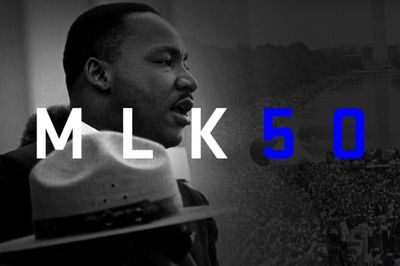I had never been to Memphis before and I was lost. This was fitting in more ways than one. I would like to think that the mutual blessing our tribe shares grants me a certain amount of insight into what other people struggling with bigotry and Injustice have to deal with on a regular basis. But two spring days in Memphis would teach me otherwise, and I would not be the only one.
The Rev. Alaina Kaylin Cobb and I had quickly discovered that we did not need GPS to find our destination. We just had to follow the people going to “where the road of ‘The Prophet’ leads,” per my friend.
The site is a former motel that has been turned into a teaching museum. The day was the anniversary of a death. You can guess it. We arrived there soon after the official ceremonies were over. It was approximately fifteen minutes past the time when—fifty years before—someone fired the fatal shot at a Baptist minister in town fighting for social justice.
The emotions are still raw. A crowd of all colors took turns doing what Alaina and I did: reflecting, grieving and acknowledging our debt to Dr. King and those who marched with him. Our own struggle for full freedom started with these heroes, and some of our tribe were there back then. Our struggles have been complicatedly intertwined. We can agree though that those who fight for social justice are heroes. We can grieve together...and learn.
Just a little bit earlier, Alaina and I had worked discreetly, sitting in the Press corner of the Memphis Convention Center watching another event unfold. The occasion was a special conference by the Southern Baptist Convention's (SBC) Ethics and Religious Liberty Commission to commemorate the teaching and legacy of Dr. King. We covered it live on Out & About Nashville's Twitter feed because what the SBC does tends to make ripples in the everyday South.
We watched a parade of African-Americans from all backgrounds step up to the platform over those two days, telling the mostly Caucasian members of the SBC spread out in front that they had more work to do. They had made progress, but bigotry was on the rise again, and this time it would have to be the descendants of those Southern Baptists who had run away to the suburbs to stand up and face the hate.
In return, more than a few members and leaders of the SBC publicly acknowledged a hard truth. The SBC had grown strong on the backs of a contemporary bigotry and racism as part of a protest movement against what we would call “multiculturalism” today, and while they had improved, there was still a long way to go. They do not hate and do not want to be associated with those who do. They were listening, and they were asking for help.
It wasn't perfect. Alaina would be the first to tweet that out, but it was a good start. There comes a time every now and then for reflections, and the 50th anniversary of a murder during one of the most frightening times in modern American history will sober anyone up for a few days—even supposedly teetotaling Southern Baptists.
The mostly white and suburban Southern Baptists who were laid out in front of me mean well, and treated Alaina and me with respect, even as open LGBTQ people. (As an aside: we had no problems whatsoever using the women's facilities as transgender women. Anyone who argues that there should be bathroom bills needs to have a chat with the SBC members present.)
They are ay least trying to acknowledge that they have much to learn about other cultures. Some have openly admitted to being scared and taking actions that they shouldn't have as a result of inherited bigotry, and fear.
Charlottesville and the rise of open hate in modern America have opened many of their eyes, and at the very least they are trying to listen and engage.
SBC—you did the right thing here. Now continue down this path and walk back that atrocious document, which will go down in history in the same light as what you said and did in the days of Dr. King and the original Civil Rights movement. Take steps to welcome home the LGBTQ people who share your heritage. They believe what you believe: many of your daughters and sons just want to come home as they really are and live as themselves.
If you can do what you did in Memphis, you can do this. Don’t wait fifty more years.
You are a good people who do good things. We know that. Whenever there is a disaster that calls for a quick response, the Southern Baptists usually respond, doing what they can to help people in need, no questions asked.
Do not let fear, pride or peculiar interpretations of Christian scripture block this path. That is the lesson from this conference. Learn from those who fight bigotry. The bigots used that same scripture to hurt people of color for centuries, and many of you acknowledged this fact last month. Find a way. You can do it, and we're ready to help you.
Be like Dr. King. Be brave.
Julie Chase is the pen name for a local trans woman.
